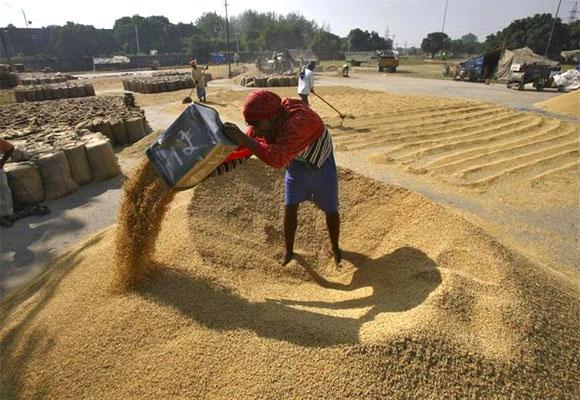 About 40 per cent of government's foodgrain is stored in an "unprofessional" way due to acute shortage of storage capacity to the tune of 35 million tonnes, industry chamber Assocham said on Wednesday.
About 40 per cent of government's foodgrain is stored in an "unprofessional" way due to acute shortage of storage capacity to the tune of 35 million tonnes, industry chamber Assocham said on Wednesday.
Currently, 70 per cent of the total warehousing capacity of 112 million tonnes is owned by the government. Additional 35 million tonnes of storage capacity is required in the 12th Five Year Plan (2012-17) period, it said.
"About 30-40 per cent foodgrain is stored in an unprofessional manner during the peak marketing season in India," said a joint Assocham-Yes Bank study.
There is a dearth of foodgrains storage capacity of about 35 million tonnes and there is an urgent need to augment modern and scientific storage facilities to keep pace with the marketable surplus, it said.
Due to inadequate storage capacity and inefficient logistics, Assocham General Secretary D S Rawat said that "around 20-30 per cent of total foodgrain harvest is wasted.
Each grain bag is handled at least six times before it is finally opened for processing."
To build additional storage capacity, he emphasised upon the need to renovate existing warehouses and implement a robust Negotiable Warehouse Receipt (NWR) system.
The study also said that only 12 per cent of the total warehouse capacity accounts for agricultural commodities, while the maximum is industrial warehousing.
The warehousing market, which is growing at 9 per cent annually, is expected to cross the Rs 35,000 crore ( Rs 350 billion) market in the 2015-16 fiscal, it said.
According to Assocham, warehousing is the backbone for developing trade and commerce and agro-processing industry, as it plays a very crucial role in strengthening agricultural supply chain, ensuring food security and price stabilisation.
Besides, it also solves the problem of glut and scarcity by maintaining uninterrupted supply of agricultural commodities in off season, it added.









